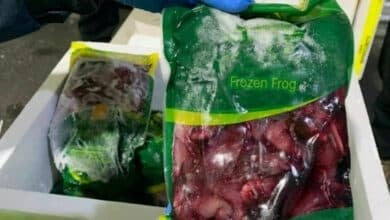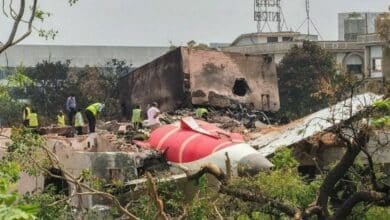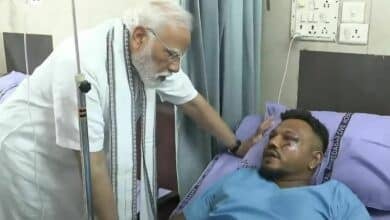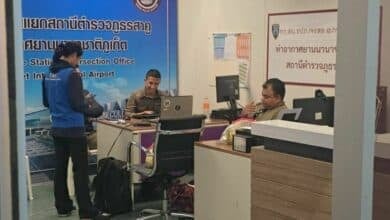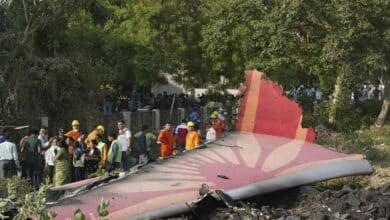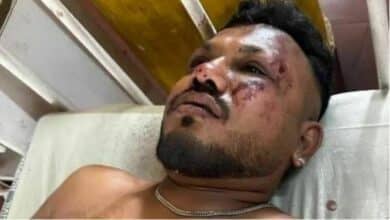World News
World news, global politics, business, technology, and culture—stay updated with breaking stories, international trends, and major events. Get the latest from The Thaiger, your trusted source for global news.
-
 Sponsored
Sponsored Is private health insurance in Thailand worth it? Real costs vs risks explained
Thailand has a strong healthcare system with both public and private options. Public hospitals offer affordable care, but many people, including expats, choose private health insurance for faster service, modern facilities, and more treatment choices. To decide if private health...
-

Taxi horror: Thai tourist harassed by cab driver in South Korea
A South Korean taxi driver sparked outrage online after harassing a female tourist from Thailand with inappropriate comments during a ride. The incident, which has since gone viral, has drawn anger from both Thai and South Korean netizens, calling for justice and better protections for women. On June 19, a woman posted a disturbing video on social media, capturing her…
-

Bangkok Airways takes off with green fuel to slash carbon emissions
Bangkok Airways Public Company Limited is propelling its Low Carbon Skies by Bangkok Airways initiative with a major commitment to reducing carbon dioxide emissions. Starting today, July 1, the airline will officially introduce Sustainable Aviation Fuel (SAF) on its commercial flights, marking a significant step towards a more environmentally friendly future for aviation in Thailand. Captain Puttipong Prasarttong-Osoth, President of Bangkok…
-

Broke British dad busted smuggling £100k cannabis from Thailand
A cash-strapped dad who feared for his life tried to smuggle £100,000-worth (around 4.47 million baht) of cannabis from Thailand — but his secret haul was busted by airport officers. Jason Horne, a 24 year old dad from Rycroft Avenue, Dringhouses in York, northeast England, narrowly avoided an immediate prison sentence after admitting he tried to import huge quantities of…
-

India’s growth to boost Southeast Asia’s aviation market
India’s significant economic expansion is anticipated to bolster Southeast Asia’s aviation market, including Thailand’s aviation sector, as noted by the Indian airline IndiGo, which intends to introduce its new business class seating to Bangkok and Phuket. IndiGo Chief Executive Pieter Elbers highlighted that whenever new Southeast Asian destinations are launched or route capacities increased, there is a notable surge in…
-

Thai Airways takes off for charity in Oslo celebration
Thai Airways stepped up to support a high-profile charity walk-run in Oslo, Norway, combining fitness, friendship, and fundraising in a celebration of diplomatic history. On Sunday, June 22, the streets of Oslo came alive as Thai Airways joined the Royal Thai Embassy in Oslo and the Faculty of Medicine Siriraj Hospital to mark 120 years of Thai-Norwegian relations with a…
-

Phuket airport tightens security, passengers urged to arrive early
Phuket airport is on high alert following the discovery of an explosive device hidden in an abandoned motorcycle on its premises. Passengers are urged to arrive at least two hours early from today, as security measures have been tightened in the aftermath of the threat. The warning comes after bomb experts successfully neutralised the device found on Wednesday night, June…
-

Thai student attacked in New York, transport staff criticised
A 26 year old Thai student and aspiring model was attacked and robbed in New York, prompting concerns about the lack of assistance from Metropolitan Transportation Authority (MTA) staff. She was forced to flag down a vehicle to seek help from police. A Facebook user shared details of the incident today, June 27, highlighting a warning for Thai nationals to…
-

Woman caught smuggling exotic food from Thailand into Australia
In a daring attempt to smuggle over 62,000kg of exotic foods into Australia, a woman has landed herself behind bars after her plan to flood the Sydney black market with illegal goods was thwarted by vigilant border agents. The woman, who tried to import a variety of goods from Thailand, used mislabelled polystyrene boxes to ship the products. Inside, agents found a disturbing range of items,…
-

China and Thailand strengthen ties on 50th diplomatic anniversary
In a bold reaffirmation of its commitment to strengthening relations with Thailand, China’s Foreign Ministry has pledged to enhance cooperation on law enforcement and mutual growth. This comes as a nine-member Thai delegation, led by Tej Bunnag, Secretary General of the Thai Red Cross Society and former foreign minister, visits Beijing to mark the 50th anniversary of diplomatic ties between…
-

AirAsia celebrates 16 years of success with exclusive trip to Krabi
AirAsia is celebrating its 16th consecutive title as the World’s Best Low-Cost Airline, and they did it in style with a special trip to Krabi. In partnership with the Tourism Authority of Thailand (TAT), the airline hosted over 120 key opinion leaders (KOLs) and media representatives from across Asia, aiming to promote Green Season travel and showcase Krabi as a…
-

Vietnamese passport dreams are made of this, leaving Thailand behind
Vietnam has torn up the red tape for foreigners with local family, making it easier than ever to bag a Vietnamese passport, no lingo, no money, and no five-year wait required, leaving Thailand behind. Foreigners married to Vietnamese citizens, or with family roots in the country, can now apply for citizenship without needing to speak the language, prove they can…
-

Phuket governor’s China trip boosts cancer care and green tech
Phuket Governor Sophon Suwanarat recently led a high-profile delegation to Guangdong province, China, on a fact-finding mission to explore cutting-edge cancer treatment, modern urban development, and green technology. The visit, which aimed at boosting Phuket’s public health services and advancing its vision of becoming a smart, low-carbon city, is set to provide invaluable insights for the island’s future. On Saturday,…
-

Air India implements temporary flight reductions and safety measures
Following the tragic loss of passengers, crew members, and individuals on the ground in the AI171 incident on June 12, Air India has made several adjustments to its operations. The airline has expressed its deepest condolences and continued support for the families affected by this devastating event. Since the tragedy, the airline has been in constant communication with the relevant…
-

Global salad showdown: From papaya power to pickled crunch
Salads started simple with salt-soaked greens—now they’re global, bold, and crafted with serious culinary flair. From Thailand’s fiery Som Tam to Italy’s rustic Panzanella, these iconic dishes offer more than just crunch—they tell stories of culture, history, and flavour in every bite. Som Tam, the ultimate Southeast Asian street food salad, bursts with life in every bite. Shredded green papaya is tossed with…
-

Paris Air Show: Thailand and Textron join forces on fighter fleet
A high-flying deal was struck at the Paris Air Show this week as Textron Aviation Defence LLC joined forces with Thai Aviation Industries (TAI) to launch a major support programme for the Royal Thai Air Force (RTAF). In a Memorandum of Agreement (MOU) signed at the international aviation event, the two companies agreed to jointly sustain and support Thailand’s fleet…
-

Brazilian busted at Phuket Airport over traffic crimes
A holiday escape turned sour for one Brazilian man after he was nabbed by immigration cops at Phuket International Airport – wanted over traffic offences and caught just before takeoff. Phuket Airport Immigration confirmed the arrest of the 35 year old suspect on Sunday, June 15, at around 10.30am. The man, whose name was not released by police, was taken…
-

King Power seeks duty-free contract renegotiation after setbacks
Thailand’s leading duty-free giant King Power is in talks with Airports of Thailand (AOT) to renegotiate its contracts across five major airports, after claiming external factors severely impacted business performance. The duty-free giant, known for its extensive presence in airports across the country, raised concerns about an increasingly challenging market and the financial burden of maintaining its original commitments. In response, King Power is…
-

Air India flight returns to Hong Kong after mid-air emergency
Just days after the devastating crash of Air India flight AI 171, which claimed at least 270 lives en route to London, another Air India Boeing 787-8 Dreamliner was forced to turn back mid-air yesterday due to a suspected technical issue. The flight, AI 315, was bound for New Delhi from Hong Kong when the crew made the precautionary decision…
-

India tragedy: Black box recovered from fatal flight
The recovery of the black box from last week’s deadly Air India crash marks a crucial step in the investigation, potentially revealing vital insights into the cause of the tragic accident. Tragedy struck last Thursday, June 12, as Air India’s London-bound flight crashed shortly after takeoff from Ahmedabad, killing at least 270 people, including most of the passengers. Now, as…
-

Thai Airways exits rehabilitation plan after four years of operation
Thai Airways (THAI) announced yesterday, June 16, that the Central Bankruptcy Court officially approved the end of its rehabilitation process. The airline now plans to seek permission to relist its shares on the stock exchange by August. THAI shared the news via its official Facebook page, stating, “The Central Bankruptcy Court has ordered the termination of business rehabilitation. THAI is…
-

British survivor recalls horrifying moments of Air India crash (video)
The British survivor of the devastating Air India plane crash has recounted the horrifying moments as the Boeing 787 Dreamliner plummeted into a building, killing 241 people onboard. “I thought I was dead,” Vishwash Kumar Ramesh said from his hospital bed, describing the chilling moment when he realised he had miraculously survived. The 40 year old British-Indian, who has lived…
-

Indian man quizzed after bomb scare on Phuket flight
A 52 year old Indian man was arrested for questioning after a bomb threat forced an Air India flight to make an emergency landing at Phuket International Airport yesterday morning. The alarming incident triggered a swift security response, with 156 passengers onboard caught in the tense drama. The flight, AI 379, was en route from Phuket to Delhi when, around…
-

Thai singer shares connection to Air India crash survivor
A Thai singer, who survived a plane crash in Surat Thani in 1998, revealed that he once sat in the same seat number as the British survivor of the recent Air India crash. The singer, Ruangsak “James” Loychusak, took to his Facebook page, Jamesruangsak, to comment on the Air India crash near Ahmedabad, India, which occurred today, June 13. In…
-

Air India flight AI171: Experts probe deadly takeoff crash (video)
A devastating crash involving Air India Flight AI171 has left 241 people dead and raised serious questions about what went wrong just moments after takeoff. The Boeing 787-8 Dreamliner, en route from Ahmedabad to London Gatwick, plunged shortly after departing Sardar Vallabhbhai Patel International Airport yesterday, June 12, just 1.5km from the runway. The tragic incident marks the first fatal…
-

British man cheats death in horror Air India crash (video)
A British man has miraculously walked away from the burning wreckage of an Air India plane crash that killed at least 241 people, making him the sole known survivor in one of the deadliest aviation disasters in recent years. The lucky survivor, 38 year old Vishwashkumar Ramesh, was seated in 11A on Air India flight AI171, which crashed into a…
-

Thailand’s ageing F-16s, what’s the next move?
Thailand’s Royal Thai Air Force (RTAF) is facing an important challenge: how to replace its ageing fleet of F-16 fighter jets while keeping pace with regional security demands and budget realities. For decades, the F-16 has been the backbone of Thailand’s air defence. But with many of these jets approaching their retirement age, the RTAF has now shifted gears, looking…
-

‘Screw-up’ at Suvarnabhumi: Broken bolt brings escalator to a halt
An escalator at Suvarnabhumi Airport gave travellers a fright this week when it suddenly ground to a halt — but no injuries were reported and engineers have already fixed the glitch. The malfunction occurred around 11pm on Wednesday, June 11, at an escalator linking the APM train station to the new SAT-1 terminal. A video clip of the incident quickly…
-

Air India flight to London crashes post-takeoff with 242 passengers (video)
Tragedy struck in Ahmedabad, India, this afternoon when an Air India flight bound for London Gatwick crashed just moments after takeoff. Flight AI171, carrying over 240 people, crashed into a residential area, sending a massive plume of black smoke into the sky. The airline has called the incident a “tragic accident,” and authorities are investigating the cause. The Boeing 787-8…
-

Jetstar Asia to ground flights by end of July amid rising costs
Just a little over a year after its new route from Singapore to Krabi took flight, the Singaporean airline JetStar Asia will cease services next month. Full refunds will be offered for affected passengers. The airline, part of the Qantas Group, has struggled to cope with rising supplier costs, high airport fees, and fierce competition in the regional low-cost flight…
-

British influencer reunited with stolen Lamborghini in Thailand
A British influencer and off-road racing fanatic has been reunited with his stolen £220,000 (9.7 million baht) Lamborghini – eight years after it was stolen by a sophisticated international car-smuggling gang and shipped to Thailand. Mark McCann snapped up the bright green Lamborghini Huracan Spyder back in 2016 as part of a high-end car rental venture. Charging punters £800 (35,000…
Broke? Find employment in Southeast Asia with JobCute Thailand and SmartJob Indonesia. Rich? Invest in real estate across Asia with FazWaz Property Group or get out on a yacht anywhere with Boatcrowd. Even book medical procedures worldwide with MyMediTravel, all powered by DB Ventures.








